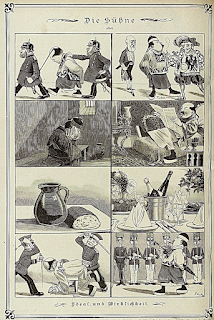The Chinese Mission of Atonement
It was great to get some early findings from the project published this week with International History Review, albeit as an in-press online version for now. This was the article on Zaifeng's voyage to Berlin to apologise to the Kaiser for the murder of his representative in China, Clemens von Ketteler, during the Boxer Uprising. You can read it here
Go on. You know you want to.
As the article makes clear, the visit was hardly a clear diplomatic success for the Kaiser or Germany, but it is worth remembering too that this diplomatic embarrassment did not translate into a change in the material conditions of empire in China.
My point in the article is not that through deft diplomacy China was able to reverse the collapse of the Chinese imperial world that had gathered pace since the Opium Wars. Rather, my concern was more about the domestic political conditions in Germany. The Kaiser was the designated representative of the German state, with a clearly limited capacity to act independently. Only he could conduct summit diplomacy (for what it was worth).
As the article shows, even within this very narrow channel, the Kaiser struggled to act in a manner that did not cause dismay both in Germany and abroad. Press and political responses ranged from anger at his incompetence through to seeing the entire episode as an indicative farce. A few tried to defend Germany's right to be unreasonable or even deny that the kowtow incident had happened.
What it does show is that the Daily Telegraph Affair in 1908 was the endpoint of a long series of diplomatic embarrassments, rather than anything new. As I hope to show in the book.
I'm still working on Chulalongkorn and the question of Siam. In that context I have to dip my lid to Peter Overlack for his 1999 article in War and Society. It's really opened the door on a few leads.
Go on. You know you want to.
As the article makes clear, the visit was hardly a clear diplomatic success for the Kaiser or Germany, but it is worth remembering too that this diplomatic embarrassment did not translate into a change in the material conditions of empire in China.
My point in the article is not that through deft diplomacy China was able to reverse the collapse of the Chinese imperial world that had gathered pace since the Opium Wars. Rather, my concern was more about the domestic political conditions in Germany. The Kaiser was the designated representative of the German state, with a clearly limited capacity to act independently. Only he could conduct summit diplomacy (for what it was worth).
As the article shows, even within this very narrow channel, the Kaiser struggled to act in a manner that did not cause dismay both in Germany and abroad. Press and political responses ranged from anger at his incompetence through to seeing the entire episode as an indicative farce. A few tried to defend Germany's right to be unreasonable or even deny that the kowtow incident had happened.
What it does show is that the Daily Telegraph Affair in 1908 was the endpoint of a long series of diplomatic embarrassments, rather than anything new. As I hope to show in the book.
I'm still working on Chulalongkorn and the question of Siam. In that context I have to dip my lid to Peter Overlack for his 1999 article in War and Society. It's really opened the door on a few leads.



Comments
Post a Comment